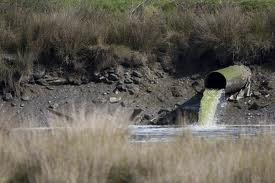Gov. Gretchen Whitmer received praise today for her overhaul of the state Department of Environmental Quality (DEQ), but it’s worth noting that the change marks the latest juggling act within state bureaucracy over how best to deal with environmental protection issues.
In recent years, each new governor who takes office tries to put their stamp on Michigan’s efforts to serve as good stewards of the state’s lakes, rivers, forests and shorelines. The past four governors – John Engler, Jennifer Granholm, Rick Snyder and now Whitmer – have employed dramatic moves to shake up the Great Lakes State’s approach toward pollution protections.
But the big question remains: Will Whitmer’s approach toward bureaucratic transformations prove any more effective than what was attempted in the past? After all, the new governor’s shake-up amounts to mostly shifting around existing resources with no net gain in employees dedicated to fixing the environment.
Whitmer’s executive directive will restructure the DEQ into a new Department of Environment, Great Lakes and Energy. She also announced the creation of new offices within the restructured department: Climate and Energy, Clean Water Public Advocate and Environmental Justice Public Advocate. The Agency for Energy will be swallowed into this new configuration.
Daunting task for new governor
To be fair, the new governor’s job on the environmental front has become exponentially more difficult than what her predecessors faced.
Michigan has become infamous internationally due to the unending Flint water crisis. In addition, high lead levels in drinking water have been detected in Detroit and other communities. What’s more, the emergence of toxic “PFAS” chemicals in drinking water sources in several locations has created a nightmare scenario.
Whitmer’s focus is on safe drinking water while adding a new emphasis on battling the effects of climate change.
“Right now, communities across our state don’t trust the water coming out of their taps, and there is a real lack of trust in state government,” Whitmer said. “It is time for that to change.
“This is about finding real solutions to clean up our drinking water so every Michigander can bathe their kids and give them a glass of water at the dinner table safely.”
The past offers no optimism
A look back at the topsy-turvy initiatives to beef up Michigan’s environmental protections reveals a disturbing lack of consistency and focus over more than two decades:
- In 1995, the DEQ was created by Republican Gov. Engler through an executive directive that transferred enforcement of environmental regulations from the Michigan Department of Natural Resources (DNR) to the newly created department. This was an Engler plan to create “more direct oversight” on pollution matters at a time when he was also reducing the number of state employees.
- In 1996, an Engler executive directive transferred oversight of environmental health programs related to drinking water and radiological protection from the Michigan Department of Public Health to the new DEQ. A second executive order moved the Low Level Radioactive Waste Authority, which had somehow been incorporated into the Department of Commerce, to the DEQ.
Another illogical bureaucratic duty was switched by Engler in 1997, when the oversight of storage tanks containing potentially hazardous materials was transferred from the Michigan State Police to the DEQ. A second executive order by the governor that year, long overdue, shifted the Michigan Environmental Science Board and the Environmental Administration Division from the Department of Management and Budget to the DEQ.
- In 2009, Democratic Gov. Granholm reversed course and merged the DNR and the DEQ into a new Department of Natural Resources and Environment (DNRE). Granholm’s executive directive took effect over objections from the Republican-controlled Senate.
- Two years later, GOP Gov. Snyder, in his first executive directive after taking office, imposed another change of direction, splitting the DNRE and returning the DNR and DEQ into separate departments.
Going back to the pre-Engler days when lawmakers engaged in benevolent views of industry – the “job providers” — the DNR dealt with a wide array of issues: environmental rules, forest management, state parks, hunting, fishing, wildlife and waterways ranging from the Great Lakes to rivers and streams. The pro-business tilt of those days remains in Lansing while state officials have struggled for nearly a quarter century to provide a balance that protects our environment.
After all of these changes, the state’s environmental debacles are undeniably worse than they were when the hapless DEQ was first created.
DEQ got off to a rocky start
Starting in the late 1990s, it was revealed that sewer systems in Metro Detroit which routinely dump partially treated sewage into Lake St. Clair had gone about three decades without receiving a state review of their Michigan permits to discharge with impunity into the waterways. Long before the Flint water crisis, the understaffed DEQ came under fire repeatedly for its inability to protect Lake St. Clair from E.coli bacteria infiltrations that resulted in hundreds of beach closings each summer.
Over time, the degradation in water quality from E.coli to lead to PFAS is undeniable. Yet, the Legislature was going in the wrong direction.
Whitmer smartly eliminated the Environmental Rules Review Committee created largely by the state Senate in the waning days of the Legislature’s 2017-18 session. That committee would have given business and industry majority control to veto countless DEQ regulations.
The driving force behind this effort was former Sen. Tom Casperson, an Upper Peninsula Republican term-limited on Jan. 1, who had referred to DEQ regulators as environmental “radicals.” Those so-called radicals had a pro-business track record of approving 99 percent of the environmental provisions proposed or opposed by businesses and developers.
Meanwhile, Whitmer’s addition of internal watchdogs such as the Clean Water Public Advocate and Environmental Justice Public Advocate have earned praised from environmental groups.
But I would suggest that, over and over again, most alterations in the past along this same path generated excessive optimism from environmentalists. We shall see.
Any cynic worth his salt would be wise to adopt a “show me” standard for what comes next.
Photo: MSU State News



 Another illogical bureaucratic duty was switched by Engler in 1997, when the oversight of storage tanks containing potentially hazardous materials was transferred from the Michigan State Police to the DEQ. A second executive order by the governor that year, long overdue, shifted the Michigan Environmental Science Board and the Environmental Administration Division from the Department of Management and Budget to the DEQ.
Another illogical bureaucratic duty was switched by Engler in 1997, when the oversight of storage tanks containing potentially hazardous materials was transferred from the Michigan State Police to the DEQ. A second executive order by the governor that year, long overdue, shifted the Michigan Environmental Science Board and the Environmental Administration Division from the Department of Management and Budget to the DEQ.


